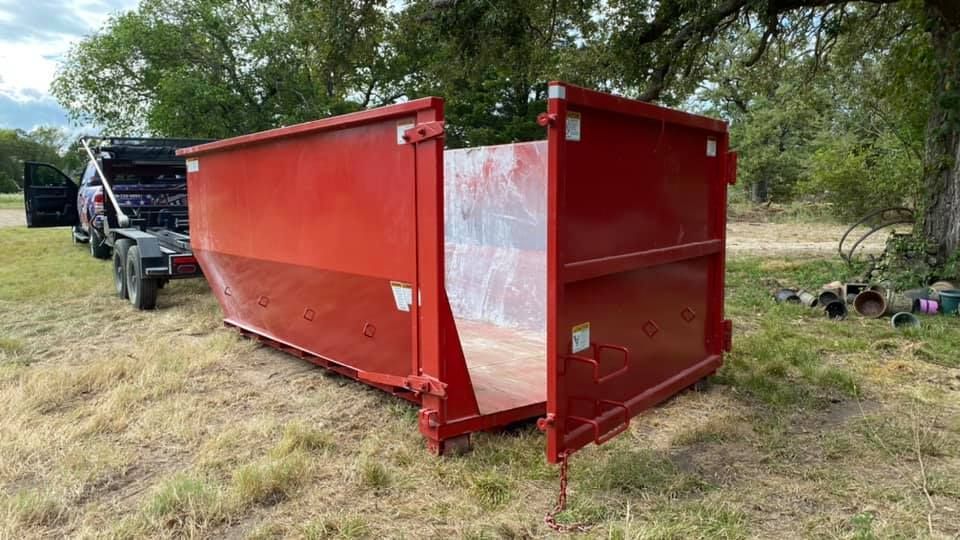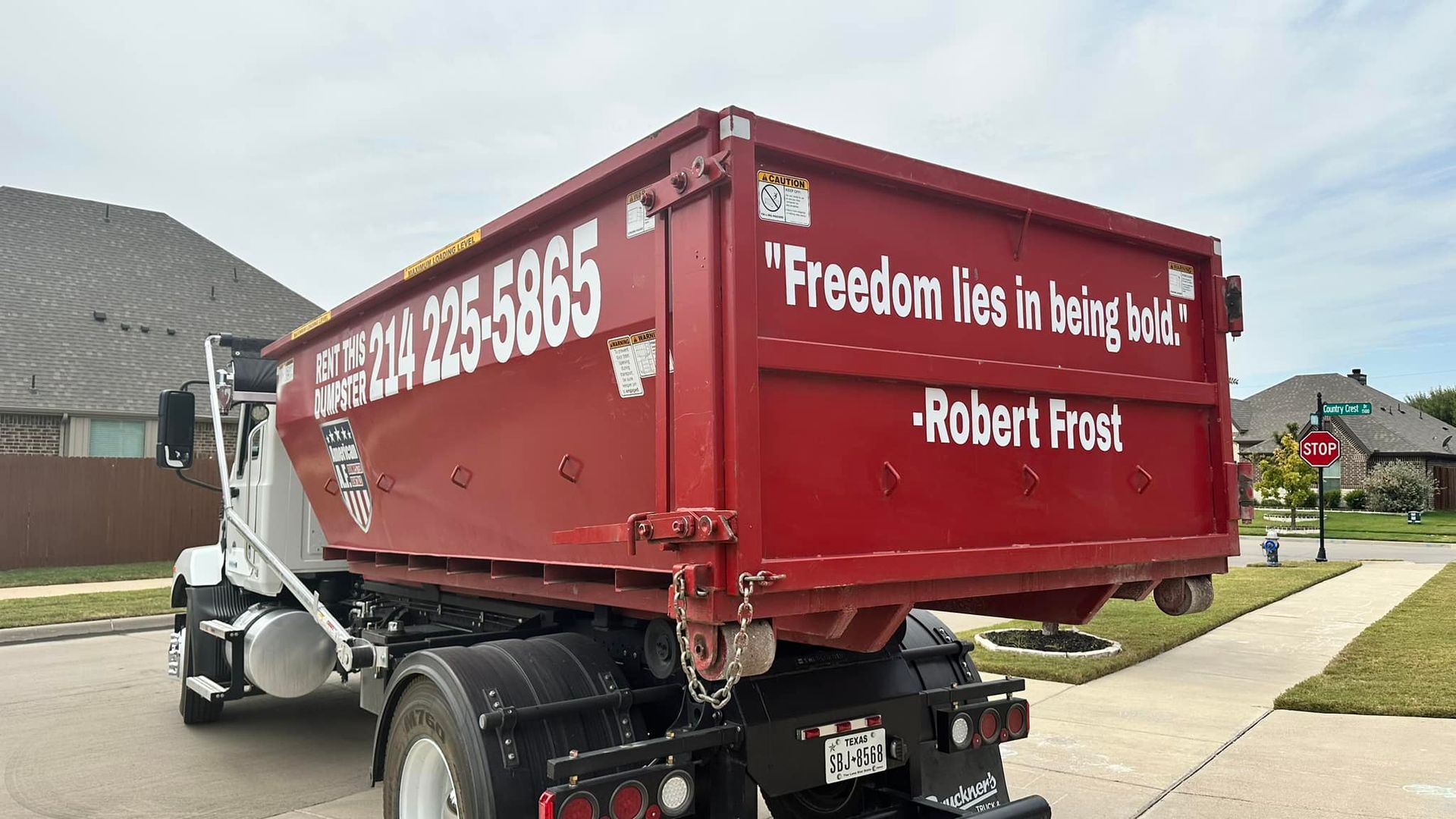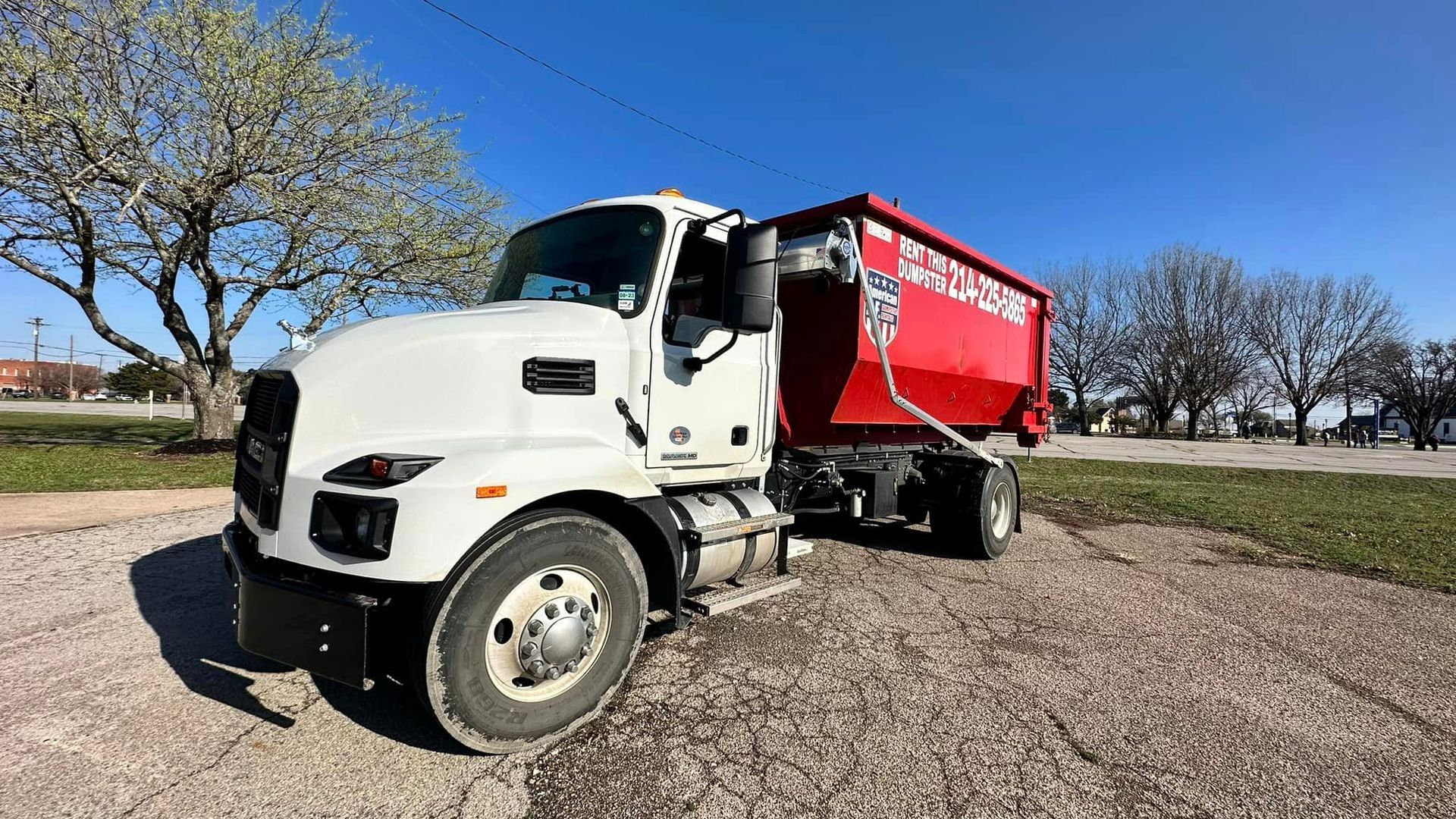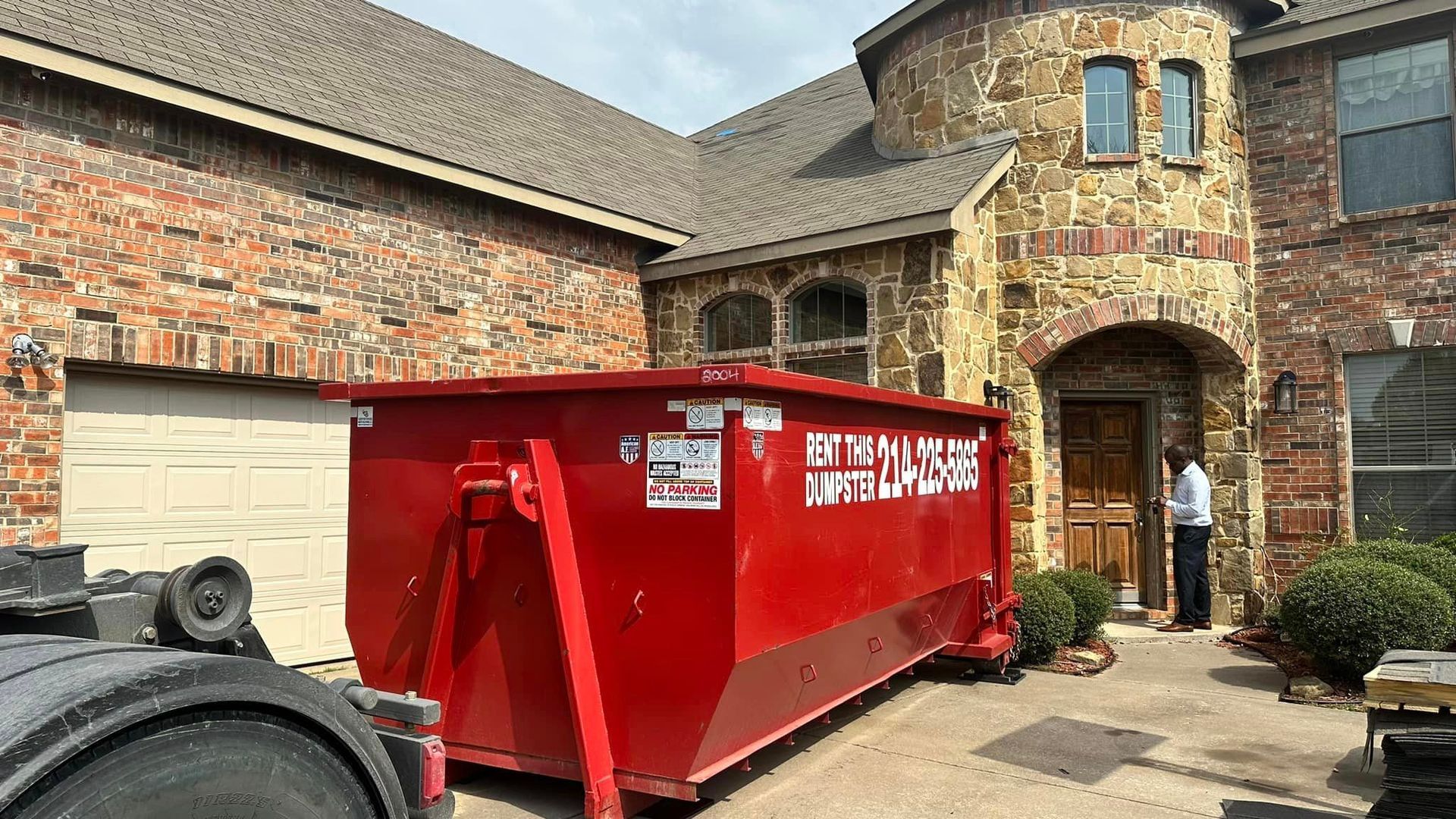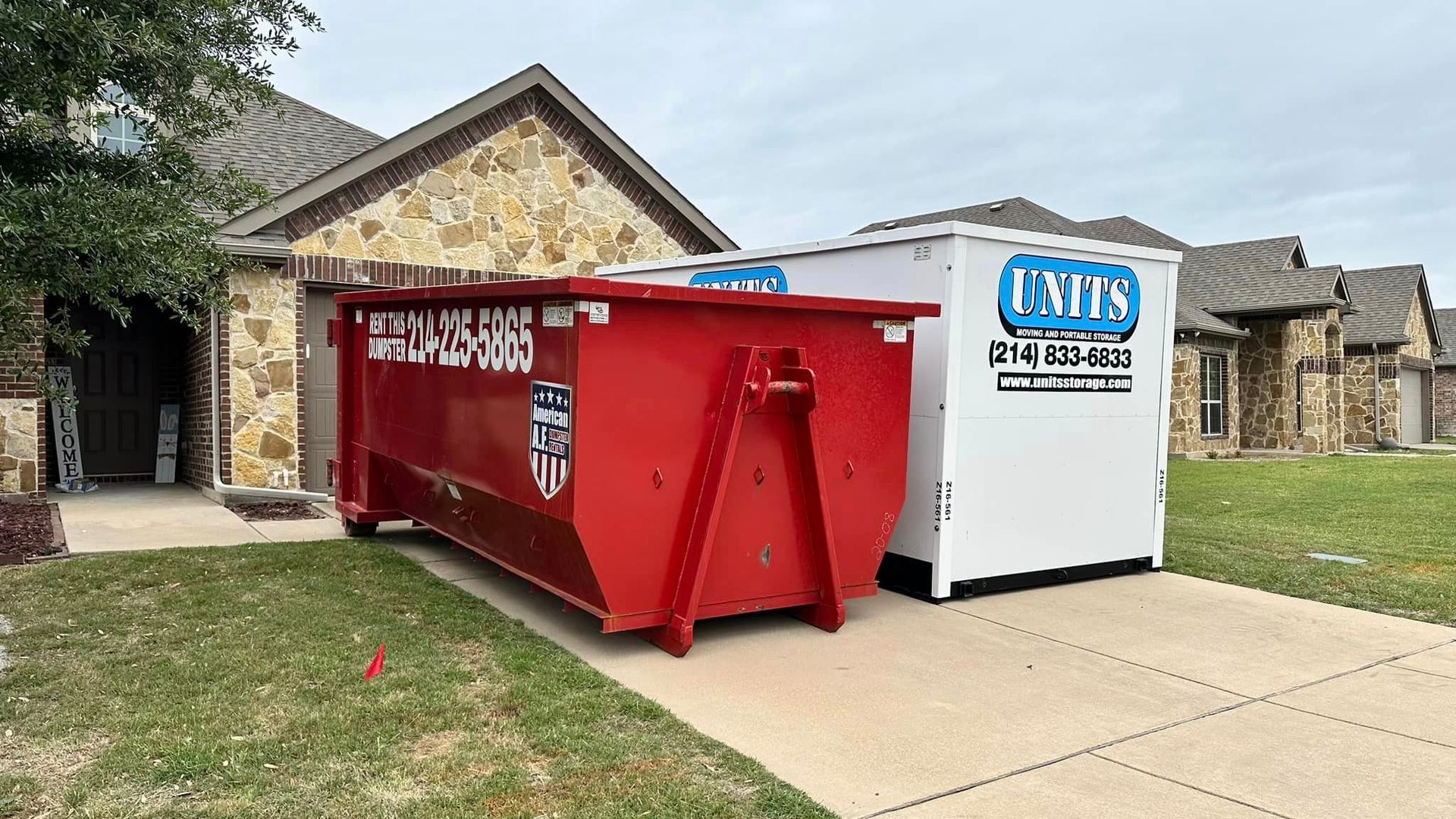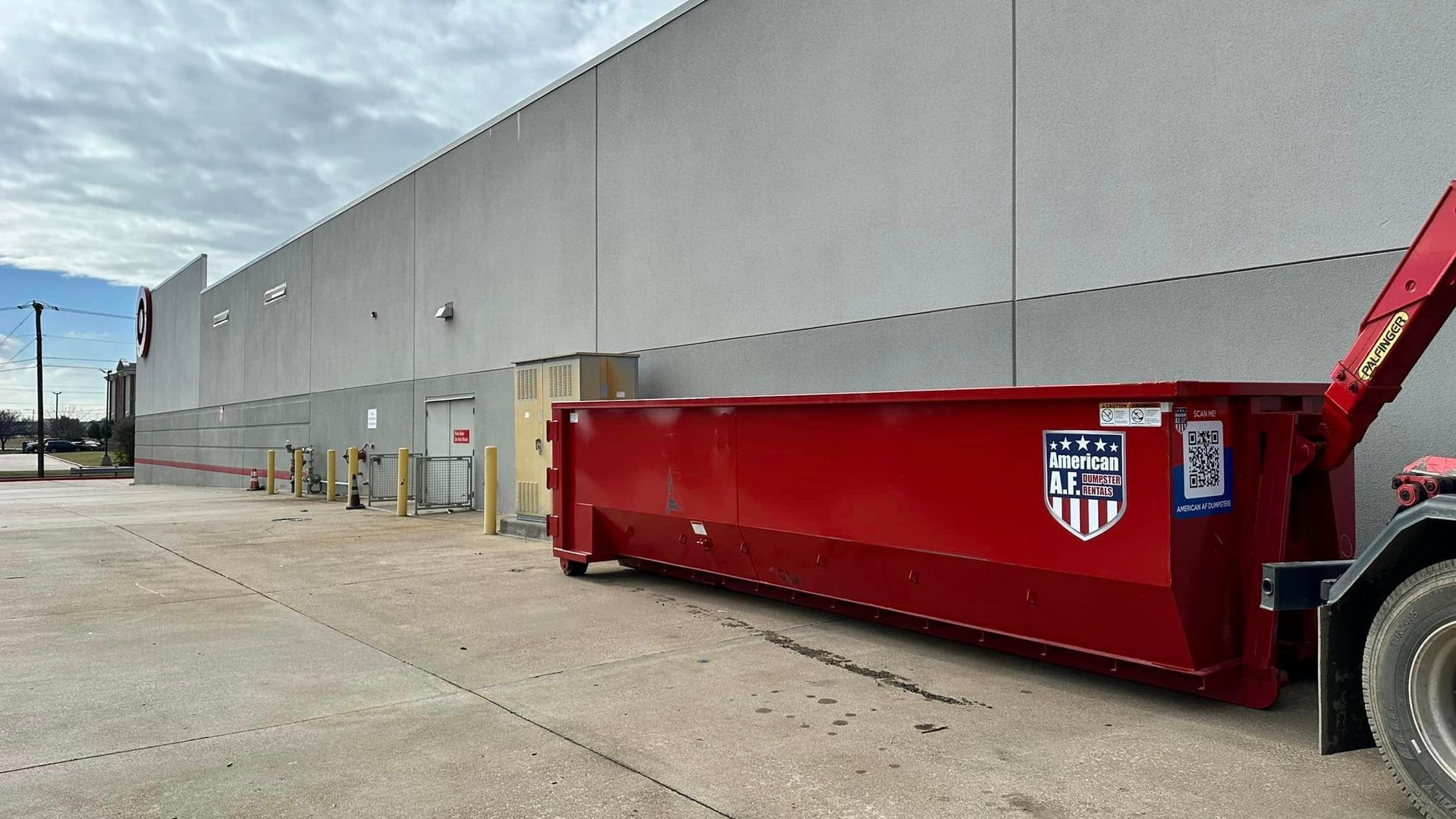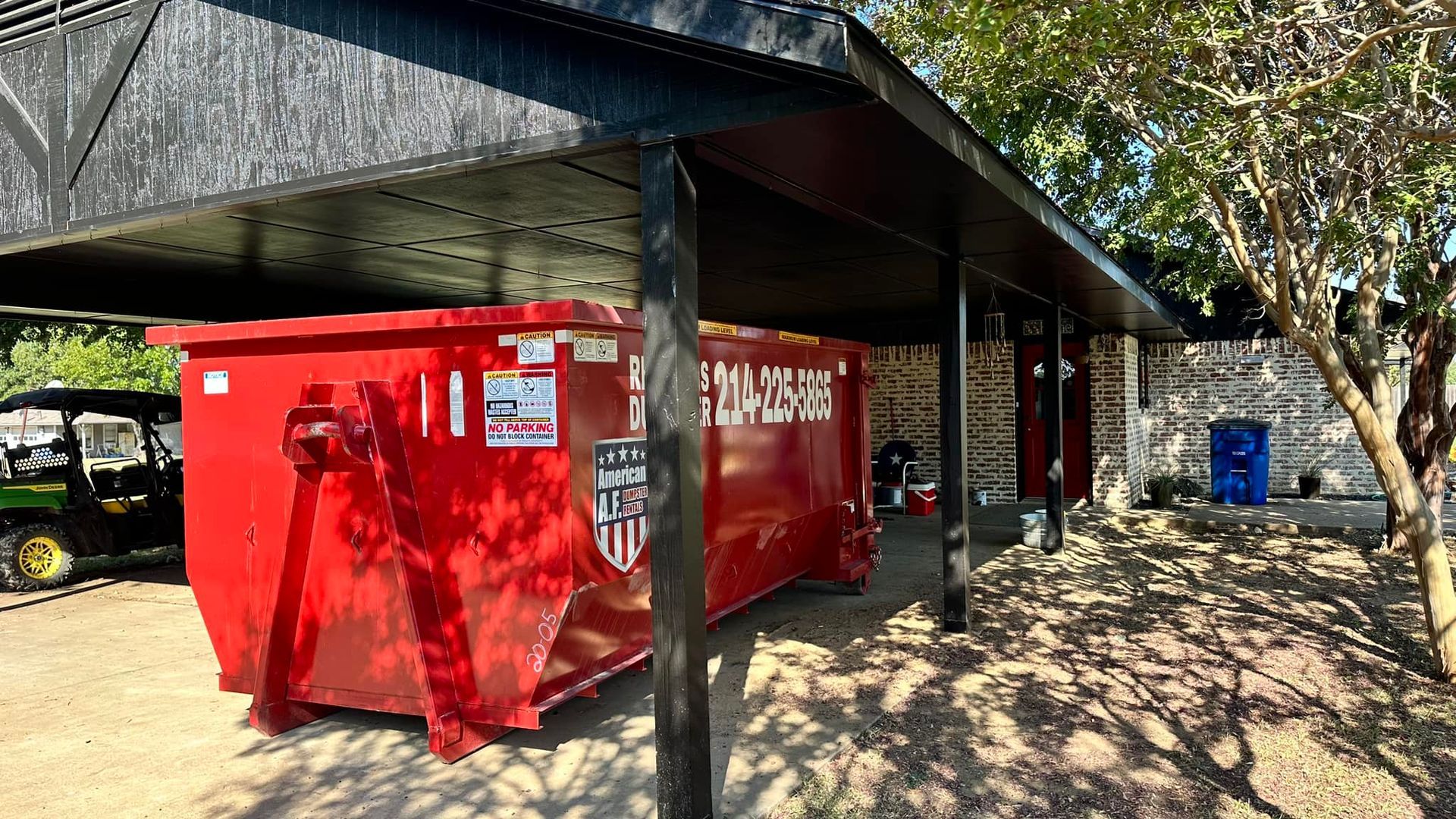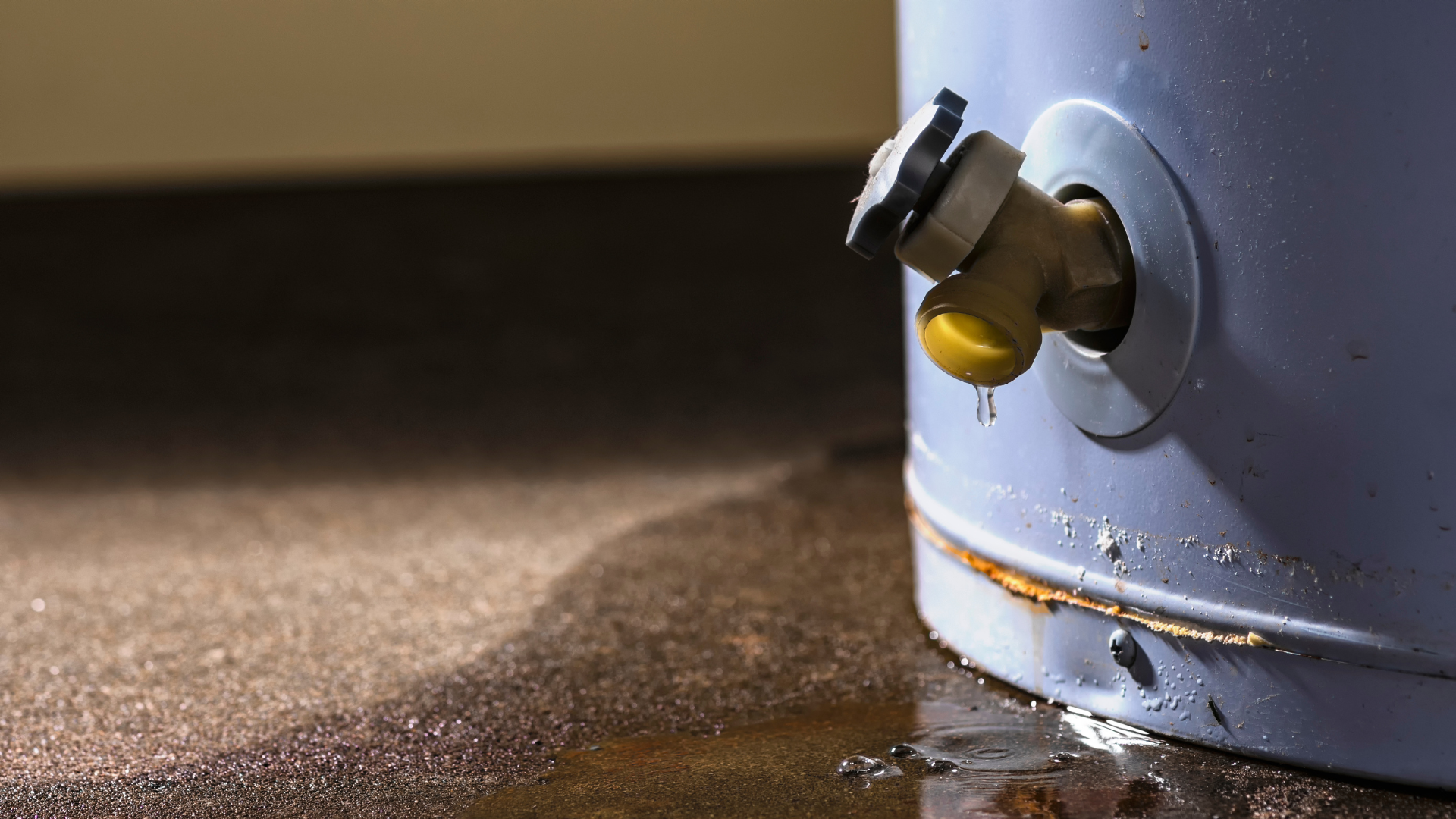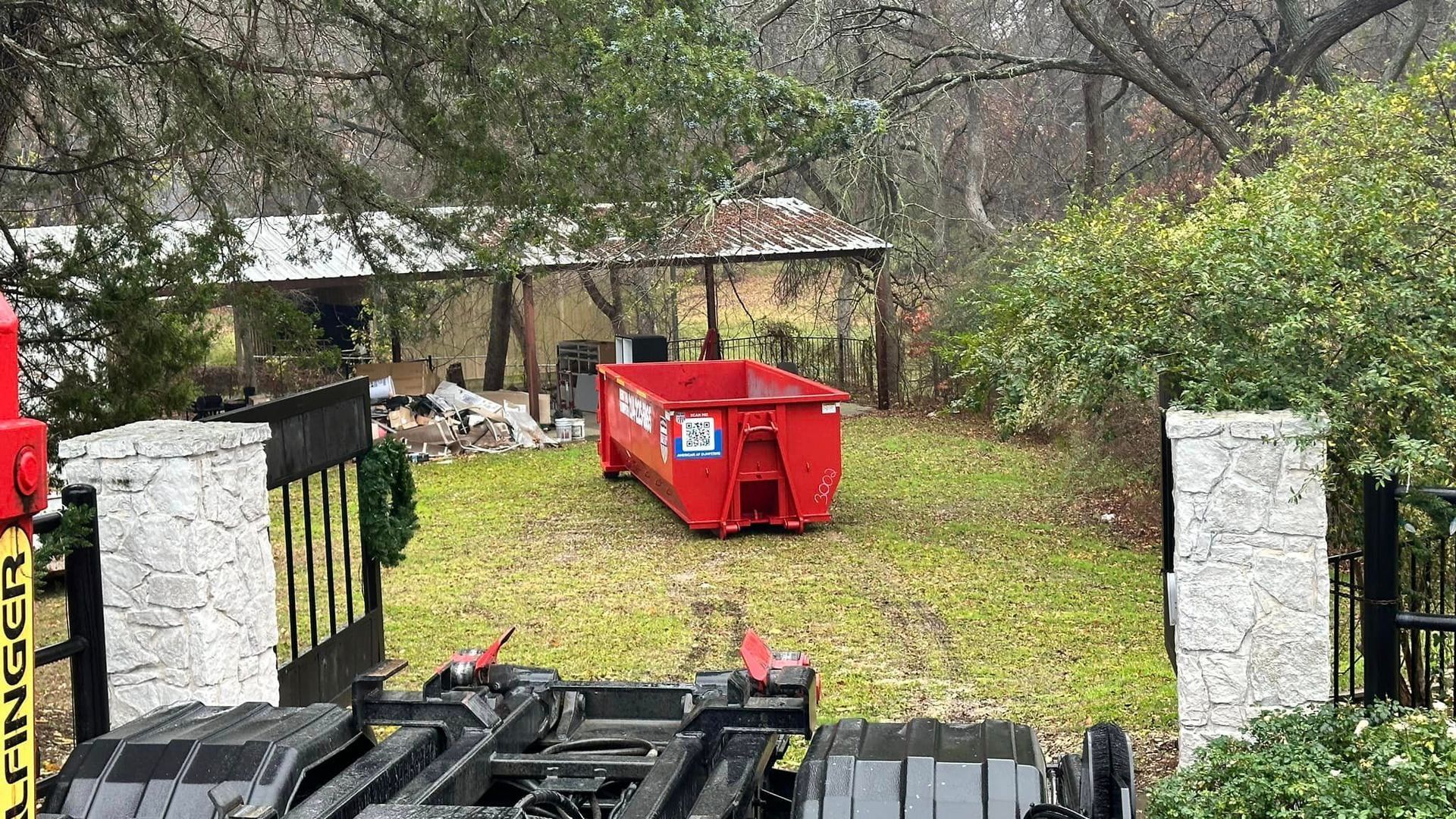Can You Buy a Dumpster? Owning Vs Renting Dumpster
Can You Buy a Dumpster? Owning Vs Renting Dumpster
When it comes to managing waste, whether for a home renovation project, a large-scale construction job, or regular business needs, one critical question often arises: is it better to buy or rent a dumpster? The answer isn't always straightforward, as it depends on a variety of factors specific to your situation. In this guide, we'll explore the pros and cons of both renting and buying a dumpster, helping you make an informed decision that aligns with your needs and budget.
Understanding Your Needs
Assessing Frequency of Use: Making the Smart Choice
Determining how often you'll need a dumpster is pivotal in deciding whether to rent or buy. Consider the nature of your project or business:
For Occasional Use:
If you're facing a one-time event like a home renovation or an infrequent need for large-scale waste disposal, renting a dumpster is typically the more budget-friendly option. It offers convenience without the commitment of a purchase.
For Regular Disposal Needs:
On the other hand, if your business or ongoing project generates waste regularly, think of a dumpster as a long-term investment. Owning a dumpster in such scenarios can significantly reduce ongoing costs and improve operational efficiency.
Space and Size Considerations: Finding the Perfect Fit
The physical space available for a dumpster and the volume of waste you need to handle are key:
Limited Space or Small Waste Volumes:
If you're constrained by space or the amount of waste you produce isn't substantial, purchasing a dumpster might not be practical. In such cases, the occasional rental that fits your specific space and size needs is more advisable.
Ample Space and Large Waste Volumes:
For those with enough space and a consistent stream of substantial waste, buying a dumpster ensures you have the right size on hand at all times, tailored to your specific needs.
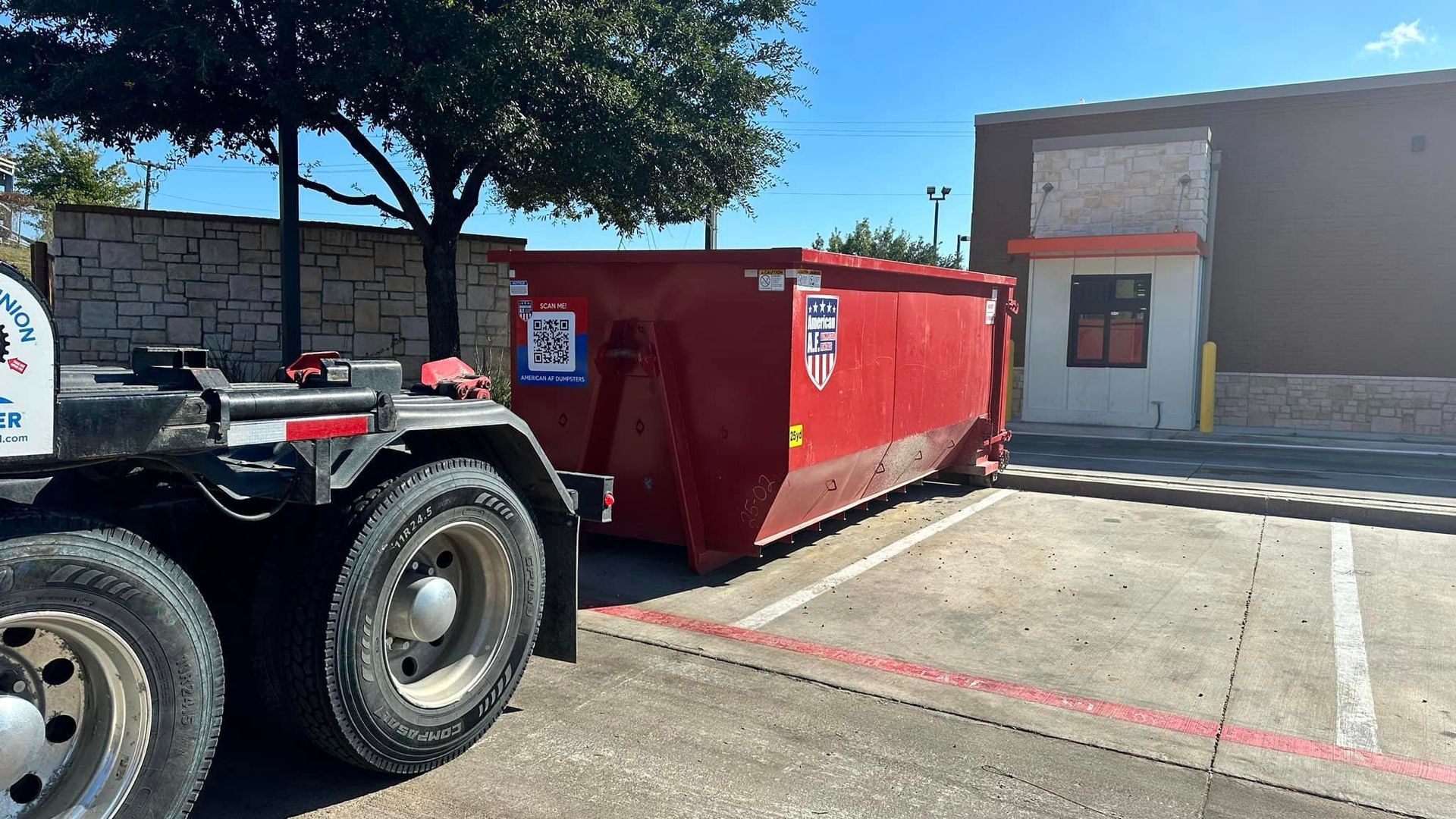
NEED A DUMPSTER?
Budget Constraints: Balancing Costs
Your financial strategy plays a critical role in the rent vs. buy decision:
Short-Term Affordability:
Renting a dumpster often appears less daunting financially in the short term, as it avoids a large upfront investment. It's a suitable choice for individuals or businesses not ready to commit to the full purchase price.
Long-Term Savings:
If you're a frequent user, consider the long-term perspective. While buying a dumpster requires a higher initial outlay, it can be a more cost-effective solution over time. This is especially true when you factor in recurring rental costs, which can accumulate to surpass the purchase price of a dumpster.
In summary, your decision to rent or buy a dumpster should be guided by how often you'll use it, the space and size requirements for your waste disposal needs, and your budget. Weighing these factors carefully will lead you to a choice that not only makes sense financially but also fits practically with your waste management requirements.
The Different Types of Dumpsters and Their Specific Applications
Selecting the appropriate type of dumpster is crucial to efficiently manage various waste disposal requirements. Here's a breakdown of different dumpster types to help you choose the right one for your specific needs:
Roll-Off Dumpsters
Best For:
- Construction sites with ongoing waste disposal needs.
- Large-scale cleanouts or renovation projects.
- Businesses requiring flexibility in waste removal.
Typical Uses:
- Collecting construction debris, including concrete, wood, and metal.
- Handling bulk waste during home renovations.
- Providing convenient, on-demand waste removal for businesses.
Front-Load Dumpsters
Ideal For:
- Commercial establishments, including restaurants and retail stores.
- Apartment complexes and multi-unit housing.
- Regular waste disposal for businesses with consistent trash volumes.
Typical Uses:
- Routine waste collection for commercial and residential properties.
- Managing regular waste generated by businesses.
- Keeping public areas clean in residential complexes.
Compactor Dumpsters
Suitable For:
- High-volume waste producers, such as supermarkets and manufacturing facilities.
- Urban settings with limited space for waste storage.
Typical Uses:
- Reducing the volume of waste through compaction.
- Minimizing the frequency of waste removal.
- Efficiently managing waste in densely populated areas.
Rear-Load Dumpsters
Perfect For:
- Small businesses and offices with limited waste output.
- Restaurants, cafes, and local shops.
- Locations where space is limited for dumpster placement.
Typical Uses:
- Collecting regular waste from small businesses.
- Handling trash from local eateries and retailers.
- Offering a space-saving waste solution for urban areas.
Each type of dumpster serves a unique purpose, tailored to different waste disposal scenarios. Whether you're overseeing a construction project, operating a business, or managing waste in a residential setting, choosing the right dumpster type ensures efficient and responsible waste disposal, meeting your specific needs.
For more information about the different types of dumpsters and what they’re used for, check out this great resource, ‘The Different Types of Dumpster Styles’.
Dumpster Sizes and Their Ideal Uses
Choosing the right dumpster size is crucial for efficient waste management. Here’s a breakdown to help you select the perfect size for your specific needs:
2 Cubic Yard Dumpster: The Compact Solution
Best For:
Small businesses, office buildings, or locations with limited space and waste production.
Typical Uses:
Regular waste from small offices, shops, or cafes with limited space.
4 Cubic Yard Dumpster: The Versatile Choice
Ideal For:
Medium-sized businesses or facilities with routine maintenance tasks.
Typical Uses:
Suitable for small restaurants, medium-sized stores, or businesses with regular waste but limited space.
6 Cubic Yard Dumpster: The Mid-Range Option
Suitable For:
Larger retail spaces, commercial areas, or small construction sites.
Typical Uses:
Handling waste from businesses with a higher volume of trash, such as larger retail stores, or for small-scale remodeling projects.
10 Cubic Yard Dumpster: The Short-Term Project Friend
Perfect For:
Short-term projects, including small-scale home renovations, garage cleanouts, or garden clearances.
Typical Uses:
Ideal for one-room renovation debris, large household cleanouts, or small landscaping jobs.
20 Cubic Yard Dumpster: The All-Rounder
A Versatile Option For:
A range of mid-sized projects, from home renovations to small construction jobs.
Typical Uses:
Great for multiple room renovations, roofing jobs, or smaller construction projects where a 30-yard dumpster might be too large.
30 Cubic Yard Dumpster: The Large Project Ally
Ideal For:
Larger construction sites, extensive home renovations, or significant demolition projects.
Typical Uses:
Accommodating debris from new construction, large-scale home remodels, or extensive yard work involving large amounts of waste.
40 Cubic Yard Dumpster: The Heavyweight Champion
The Best Choice For:
Major construction projects, commercial cleanouts, or large-scale cleanups.
Typical Uses:
Handling waste from new building constructions, large demolition projects, or major commercial renovations.
Each dumpster size has its unique advantages, tailored to different scales and types of waste management needs. Whether you're dealing with small regular waste from a business or tackling a large construction project, there's a dumpster size that fits the bill. Choosing the right one ensures not only cost-effectiveness but also efficient and responsible waste management.
For more information about the different sizes of dumpsters and what they’re good for, please read this great article, ‘Trash Dumpster Sizes for Your Needs’.
Renting a Dumpster: Weighing the Pros and Cons
Renting a dumpster can be a practical solution for various waste management needs. Here's a deeper look at the advantages and disadvantages to help you decide if it's the right option for you.
Advantages of Renting a Dumpster
Flexibility for Every Project:
Renting shines when it comes to flexibility. Whether it's a weekend home cleanout, a one-time event, or a short-term construction project, you can choose a dumpster that fits your specific needs without a long-term commitment. This adaptability is perfect for projects with a defined start and end date.
Convenience is Key:
When you rent a dumpster, the rental company handles the logistics. This includes delivery, setup, and removal, simplifying your project management. There's no need to worry about ongoing maintenance, and once your project is complete, the dumpster is taken away, freeing you from storage concerns.
A Range of Options at Your Fingertips:
Dumpster rental companies often boast a wide selection of sizes and types, allowing you to choose the perfect dumpster for your specific waste volume and type. This variety ensures that you’re not overpaying for excess capacity or finding yourself with too little space.
Disadvantages of Renting a Dumpster
The Cost Factor Over Time:
For short-term use, renting a dumpster is cost-effective. However, if you find yourself needing a dumpster frequently, the rental costs can add up over time, potentially making it a less economical choice in the long run compared to purchasing.
Availability Can Be a Challenge:
During peak seasons or in high-demand areas, securing the right size and type of dumpster can be challenging. This might lead to compromises, either in terms of size or the timeline of your project.
Dependent on Rental Company's Schedule:
When renting, you rely on the rental company for the timely delivery and pickup of the dumpster. This can sometimes lead to scheduling conflicts or delays, which might affect your project timeline. Additionally, you have limited control over the condition and specific features of the rented dumpster.
Renting a dumpster is an excellent option for those needing a temporary waste management solution, offering flexibility, convenience, and a variety of options. However, it's important to consider the long-term costs, potential availability issues, and the dependency on the rental company's schedule. Balancing these factors will help you determine if renting a dumpster aligns with your project's needs and goals.
Buying a Dumpster: Exploring the Benefits and Drawbacks
Purchasing a dumpster can be a significant decision, especially for those with regular waste management needs. Let's delve into the advantages and disadvantages to provide a clearer picture of what buying a dumpster entails.
Advantages of Buying a Dumpster
Long-Term Cost-Effectiveness:
If you're in a situation where you consistently need a dumpster, purchasing one can be more economical over time. While the initial cost is higher, owning a dumpster eliminates ongoing rental fees, making it a financially savvy choice for frequent users.
Complete Control Over Your Dumpster:
When you own a dumpster, you have total authority over its use. This means you can use it as frequently as needed without worrying about rental periods or availability. You're also in charge of its maintenance, ensuring it's always in the condition you require.
Ready When You Need It:
Owning a dumpster means it's available whenever you need it, without the hassle of planning around rental availability. This can be particularly beneficial for businesses with unpredictable waste production or for properties undergoing continuous construction or renovation work.
Disadvantages of Buying a Dumpster
Upfront Investment:
The initial cost of purchasing a dumpster can be substantial. This is a crucial factor to consider, especially for small businesses or individuals on a tight budget. The investment makes sense if the long-term usage justifies the cost.
Storage Space Required:
When you own a dumpster, you need to have adequate space to store it when it's not in use. This can be a significant consideration, especially for those with limited space. The storage area must also be appropriate for the size of the dumpster and accessible for when it needs to be moved.
Maintenance and Repairs Are On You:
Owning a dumpster means you're responsible for its upkeep. This includes regular cleaning, dealing with wear and tear, and repairing any damage. These maintenance tasks require both time and money, and should be factored into the decision to buy.
Buying a dumpster is a commitment that comes with its set of benefits and challenges. It offers long-term cost savings, complete control, and immediate availability, making it an excellent option for those with regular, ongoing waste disposal needs. However, the initial investment, storage requirements, and maintenance responsibilities are important factors to consider. Weighing these pros and cons will help you decide whether purchasing a dumpster is the right move for your specific situation.
Making the Decision: Renting vs. Buying a Dumpster
The choice between renting and buying a dumpster hinges on several key factors. Understanding these will guide you to a decision that aligns with your project's demands and financial situation. Let's break down these considerations to aid in your decision-making process.
Short-term vs. Long-term Considerations: Assessing Project Duration
For Short-term Projects:
If your project has a definite beginning and end, such as a home renovation or a one-time event, renting a dumpster is often more practical and cost-effective. It provides the flexibility you need without the commitment of a long-term investment.
For Long-term, Frequent Use:
If you're managing ongoing projects or your business generates regular waste, purchasing a dumpster might be more beneficial in the long run. Owning a dumpster can be a cost-saving measure over time, eliminating the need for repeated rentals.
Cost-Benefit Analysis: Evaluating Financial Implications
Understanding Rental Costs:
Consider the cumulative cost of renting a dumpster over time, especially if you anticipate needing it frequently. Regular rental fees can add up, sometimes surpassing the one-time cost of purchasing a dumpster.
Factoring in Purchase Costs:
When thinking about buying, remember that the initial investment is just the start. Consider the costs associated with maintenance, repairs, and storage. These ongoing expenses can impact the overall financial benefit of owning a dumpster.
Evaluating Personal or Business Needs: Tailoring to Your Specific Situation
Volume of Waste:
The amount of waste you need to manage is a significant factor. Larger volumes or more frequent disposal needs may justify purchasing a dumpster.
Project Duration and Frequency:
Reflect on how often and for how long you will need a dumpster. Frequent use or long-term projects lean towards buying, while occasional use favors renting.
Financial Capability:
Your budget plays a crucial role. Assess whether you have the resources for an upfront purchase or if the spread-out cost of renting aligns better with your financial situation.
Choosing between renting and buying a dumpster is a decision that should be based on a thorough analysis of your specific requirements and financial capacity. Consider the length and frequency of your waste disposal needs, conduct a cost-benefit analysis to understand the long-term financial implications, and align your choice with your personal or business needs. By carefully evaluating these factors, you can make an informed decision that best suits your waste management requirements and budgetary constraints.
Tips for Renting a Dumpster
At American AF Dumpsters, we understand that renting a dumpster can sometimes be overwhelming. That's why we've compiled a list of essential tips to help streamline your rental process. Whether you're tackling a home renovation project or managing construction debris, these guidelines will ensure that you get the most out of your dumpster rental, both in terms of efficiency and cost-effectiveness.
- Assess Your Needs:
Determine the right size and type of dumpster for your project to avoid overspending or underestimating your waste disposal needs.
- Understand Rental Terms:
Carefully review the rental agreement for duration, fees, weight limits, and prohibited items to avoid unexpected charges.
- Plan Ahead:
Schedule your dumpster rental in advance, especially during peak seasons, to ensure availability.
- Check for Permits:
Some areas require permits for dumpsters placed on public property. Always check local regulations beforehand.
- Compare Prices:
Get quotes from multiple rental companies to find the best deal, but also consider their reputation and customer service.
- Prepare the Site:
Ensure the drop-off location is accessible and clear of obstructions for easy delivery and pickup of the dumpster.
- Be Mindful of Weight Limits:
Avoid overloading the dumpster to prevent additional fees and ensure safe transportation.
- Recycle When Possible:
Consider separating recyclable materials to reduce waste and possibly save on disposal costs.
If you're in or near Dallas, residential or commercial, and in need of a reliable dumpster rental, look no further than American AF Dumpsters. We offer a range of sizes and flexible rental terms to suit your specific needs. Don't let waste management be a hassle in your project. Contact us today, and let us provide the efficient, hassle-free service you deserve. Rent a dumpster from American AF Dumpsters now and experience the ease and convenience of professional waste management solutions.
Tips for Buying a Dumpster
At American AF Dumpsters, we choose to purchase our high-quality dumpsters from Keystone Waste Solutions, known for their robust and reliable roll-off containers. If you're considering buying a dumpster, here are some tips to ensure you get the same level of quality as we did from Keystone:
- Assess Your Needs:
Determine the right dumpster size for your requirements. Keystone offers a variety of sizes, so select one that matches your waste generation.
- Quality Over Cost:
Investing in a high-quality dumpster from a reputable manufacturer like Keystone ensures long-term durability.
- Understand the Specifications:
Review the specifications of the dumpsters offered by Keystone to make sure they align with your needs.
- Consider the Space:
Ensure you have adequate storage space for the dumpster you purchase.
- Maintenance and Care:
Plan for the maintenance of your dumpster. High-quality products from Keystone are built to last but still require care.
- Environmental Impact:
Consider environmentally friendly options. Keystone's dumpsters are designed with sustainable practices in mind.
For those in Dallas, Texas, and across North America, Keystone Waste Solutions LLC offers custom roll-off containers, along with standard options, for diverse waste management needs. Their commitment to innovation, quality, and customer service ensures effective solutions for any company. Keystone's capability to ship their containers across North America makes them a top choice for reliable waste-handling equipment. Contact them to discuss your specific requirements and learn more about their products and services. Learn more about
Keystone Waste Solutions.
FAQS
-
How Big is a 10-Yard Dumpster?
A 10-yard dumpster, ideal for small-scale projects, typically measures about 12 feet long, 8 feet wide, and 3.5 feet high. This size is perfect for residential cleanouts or small remodeling jobs.
-
What is the Smallest Commercial Dumpster?
The smallest commercial dumpster is usually the 2-yard dumpster. This compact size is best suited for small businesses or those with limited space and minimal waste production needs.
-
How Do I Choose a Dumpster?
When choosing a dumpster, consider the size and scope of your project, the type of waste you're disposing of, and the available space for dumpster placement. It's important to select a size that accommodates your waste without being excessively large.
-
How Do You Load a Roll-Off Bin?
To load a roll-off bin effectively, start by placing heavier items at the bottom. Then evenly distribute the weight and fill in the gaps with smaller items. This method helps maximize space and prevents shifting during transportation.
-
What is the Most Popular Dumpster Size?
The 20-yard dumpster is often the most popular choice for a variety of projects. It offers a balanced combination of capacity and footprint, making it suitable for medium-sized cleanups and renovations.
Blog Summary
In "Can You Buy a Dumpster? Owning Vs Renting Dumpster" we explored the factors influencing the decision to rent or buy a dumpster, including usage frequency, space and size requirements, and budget constraints. Key considerations include the nature of your project (short-term vs. long-term), the total cost of ownership, and the specifics of your waste management needs. We also discussed the advantages of renting from American AF Dumpsters, known for excellent service and variety, and buying from reputable manufacturers like Keystone Waste Solutions, recognized for quality and long-term value. The guide aims to provide clear insights to help you make an informed choice that aligns with your waste management needs and financial situation.

Powered by MagnateProSEO
All Rights Reserved | American AF Dumpsters

